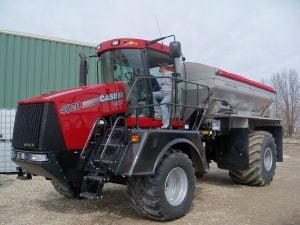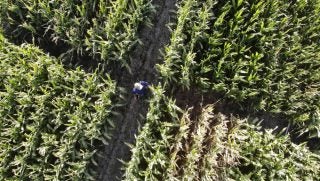Rust not only ruins the pristine look of a factory paint job on a brand new John Deere or Case IH; it wreaks havoc on the pocketbooks of many farmers. According to the National Association of Corrosion Engineers (NACE), rust costs the agricultural industry $1.1 billion a year, based on corrosion costs representing 5 to 10 percent of the value of all new equipment.
A natural process, corrosion causes the deterioration of metal when exposed to the environment. Rust, or iron oxide, is the material produced by the corrosion process.
For farmers, rust is inevitable. Farm machinery is often operated in a harsh environment of dirt, dust, grime, and chemicals. Rust is also a major problem due to the use of fertilizers, which are highly corrosive to metal when mixed with water. Fertilizers exist in two states, free and reactive. In their free state, removal is possible using power washing and special detergents. In their reactive state, it is not the same story as they achieve an electrochemical bond with metal that is extremely hard to break.
Jim Deardorff, president of Superior Company, saw firsthand the wear and tear on fertilizer equipment. Cleaning and painting farm equipment since the 1980s in Northwest Missouri, Deardorff noticed a good paint job lasted only about five to 10 years.
In 2010, he began testing various cleaning and clear-coat products designed to extend the service life of factory applied coatings. He discovered traditional cleaning of farm equipment was largely ineffective because it fails to remove the microscopic chemical residue found in joints, welds, crack, and crevices — the prime locations for corrosion.
Based out of his shop in Chillicothe, Missouri, Deardorff began his own program for cleaning farm equipment, Farm Clean & Shine. The first maintenance program to use soluble salt detergents in combination with nano-coatings to extend coating life, Farm Clean & Shine improves necessary maintenance operations by keeping equipment clean and dry. As Deardorff points out — parts repair and replacements are easier when dirt, grime, and rust build up is eliminated.

“The agriculture industry does more maintenance than any other industry. Imagine how much easier it is to do maintenance on equipment if it is cleaner,” Deardorff said. “If you look at all that surface area and maintain it and clean it in the first place, you are more likely to spot a loose bolt or a slight crack.”
One major component of Deardorff’s program is Permanon, a surface protection that eliminates the need for buffing or polishing. Permanon utilizes waterborne nano-engineered particles of Silicium that electrostatically bond to the surface being protected. Permanon protection is geared to outlast wax or oil-based renewable surface protection and comes in a convenient concentrated form. One of Deardorff’s customers recently remarked to him how much less they had to clean the combine windshield after using his program with Permanon.
Today his cleaning program is used on cars, trucks, tractors, boats, trailers, combines, and spray planes. However Deardorff warns Farm Clean & Shine isn’t for every farmer.
“This program is not for the farmers who trade equipment in, but more for the farmer who buys a tractor and keeps it 25 years,” Deardorff said. “This is for the guy that hangs on to stuff, and this reduces maintenance costs and repairs. The best paint job comes from the factory. If you can make it last, the higher value that is to you.”
To purchase Farm Clean & Shine or to see a procedure guide and testimonial photos, Deardorff can be reached at jimdeardorfftwo@gmail.com.



